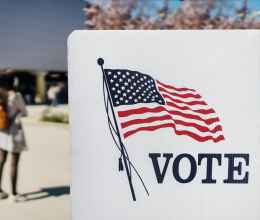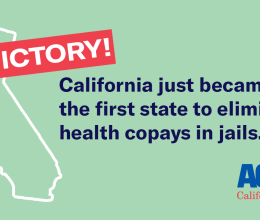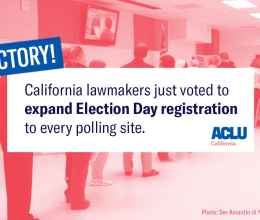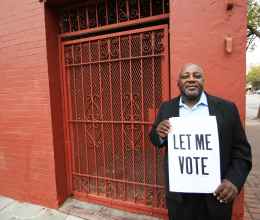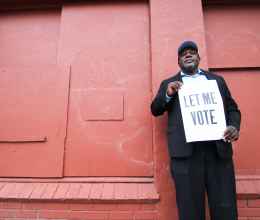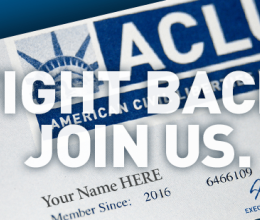The California Department of Motor Vehicles (DMV) took the necessary first steps toward improving voter registration services offered online and at its 174 field offices across the state, though it still will need to address some major issues.
Beginning this month, people who are eligible and affirmatively choose to register when applying for or renewing a driver license or identification card at a DMV field office will:
- Have their voter registration information sent electronically to the California Secretary of State;
- Be able to provide additional information, such as party affiliation and vote-by-mail preference, at a second, optional step;
- Be able to register to vote or update their voter registration through an integrated link to the California Online Voter Registration system when renewing their license or identification card online ; and
- Have the option of obtaining voter registration services in ten languages.
“For the past 20 years, if someone wanted to register to vote through the DMV they had to fill out an entirely separate voter registration card,” said Helen Hutchison, President of the League of Women Voters of California. “Now, when a person goes in to get a driver’s license, the basic voter registration questions are integrated into the DMV’s forms. Unfortunately, to provide additional party and language preference, a prospective registrant needs to go to a separate room with a touchscreen.”
In January 2014, the Presidential Commission on Election Administration, established by President Obama after the 2012 elections, issued a report that found widespread disregard of the National Voter Registration Act (NVRA) and noted that “DMVs…are the weakest link in the system” of voter registration established by that law.
The DMV’s effort to improve voter registration comes after several voting rights organizations threatened a lawsuit if the agency did not make changes to meet requirements of the NVRA. Under the NVRA,states are required to offer driver license and ID card holders the opportunity to register to vote and to provide voter registration services simultaneously with their initial application, renewal, and change of address transactions without asking customers to provide duplicative information.
As a result of this pre-litigation notice, sent in February 2015, the DMV and California Secretary of State Alex Padilla executed a Memorandum of Understanding (MOU) with ACCE Institute, California Common Cause, the League of Women Voters of California, the National Council of La Raza, and individual California citizens deprived of proper voter registration services at DMV.
The organizations that sent the notice of noncompliance are represented by the ACLU of California, Dēmos, Project Vote, and the law firm of Morrison & Foerster. The notice and the MOU are part of a national effort by these organizations to increase compliance with Motor Voter.
“Access to voting is one of the most important civil rights issues of our day,” Kathay Feng, Executive Director of California Common Cause said. “The DMV and the Secretary of State have taken the first step to offering millions of people a modern and seamless way to register to vote and update their registrations when they apply for or renew a license or identification card. We look forward to ongoing work with the DMV, the Secretary of State, the legislature, and other stakeholders to ensure that people can register to vote or update their registration in one simple step in the future.”
“It is exciting that people can apply to vote when they are renewing or applying for licenses and ID cards by simply checking a few boxes on the DMV application,” said Christina Livingston, Executive Director of ACCE. “However, we are concerned the two-step process could result in thousands of Californians being closed out of some party primaries since people who check the box on the DMV application will be registered to vote even if they don’t complete step two.”
“We welcome this solid step to help eligible Californians become voters. We still need to build on this, because we still have a two-step process requiring voters to go to a separate room with touch screens to provide their party preference, their language preference, and whether they want to receive their ballots by mail,” said Delia de la Vara, National Council of La Raza’s Vice President for the California Region. “If about a third of people are leaving the DMV field offices without completing the optional portion of the registration process, we have to increase our efforts to reach these people, particularly those who did not provide their language preference and will now receive voting materials in English instead of the language of their choice.”
***


